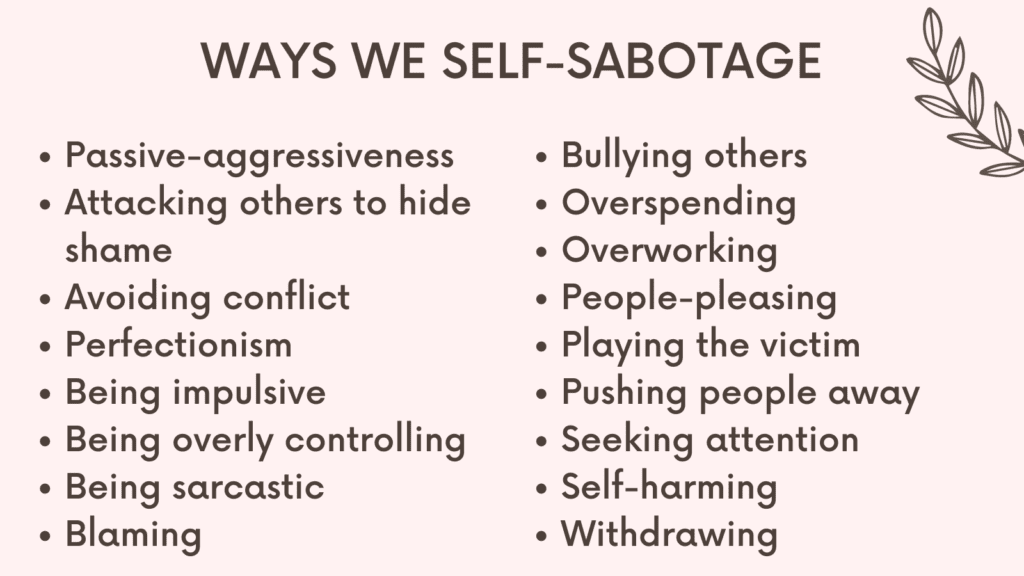You miss deadlines even though you care. You downplay your achievements. You procrastinate on tasks you’re fully capable of completing. You overthink simple emails or avoid asking for help. On the surface, it looks like lack of motivation — but beneath it, self-sabotage at work is often rooted in fear, shame, or self-protection.
Breaking the cycle isn’t about working harder. It’s about becoming more aware of the internal stories and emotional patterns that are getting in your way — and learning how to respond differently.
Here’s how to recognize and stop sabotaging yourself at work so you can succeed without burning out or shutting down.
12 Subtle Ways You May Be Sabotaging Your Work
1. You Procrastinate on Important Tasks
You delay starting until the pressure is unbearable, convincing yourself you work better under stress. In reality, it’s often fear of failure or not doing it perfectly that keeps you frozen.
2. You Downplay Your Achievements
You say things like “It was nothing” or “I just got lucky.” This keeps you from being recognized, promoted, or truly owning your skills — all because visibility might feel risky.
3. You Overcommit and Burn Out
You say yes to everything to prove your value, then resent it later. Overcommitting makes you feel needed, but it quietly erodes your energy and focus.
4. You Avoid Asking for Help
You don’t want to look incompetent, so you struggle silently. This creates unnecessary stress and keeps you from growing — and from being seen as collaborative.
Related: Best 7 Self Sabotage Books
5. You Constantly Over-Edit or Second-Guess Your Work
You redo tasks multiple times or hesitate to submit work until it’s “perfect.” Perfectionism delays progress and often masks a fear of criticism or being “not enough.”
6. You Isolate Yourself
You avoid collaboration, skip networking, or keep your ideas to yourself. Isolation may feel safe, but it cuts you off from opportunities and visibility.
7. You Dismiss Positive Feedback
When someone compliments you, you shrug it off or downplay it. Rejecting validation reinforces the belief that you’re not doing well — even when you are.
Related: Half-Smiling Technique to Reduce Emotional Distress
8. You Wait Until You “Feel Ready”
You hold back on pitching ideas, applying for promotions, or speaking up in meetings — waiting for the perfect moment. But action builds readiness, not the other way around.
9. You Talk Yourself Out of Opportunities
You convince yourself you’re not qualified, not experienced enough, or not the right fit — so you don’t even try. Fear of rejection keeps you stuck.
10. You Stay in Confusing or Unclear Roles
You don’t ask for clarity, feedback, or structure — and then feel lost or undervalued. Staying in ambiguity can feel easier than risking rejection or correction.
11. You Focus on Being Liked Instead of Being Effective
You avoid giving feedback, asserting your ideas, or setting boundaries because you don’t want to upset anyone. People-pleasing at work can slowly erode your leadership and self-respect.
12. You Criticize Yourself Before Others Can
You make jokes about your own work, minimize your ideas, or pre-emptively apologize. It’s a way to manage shame — but it also tells others not to take you seriously.
Related: How to Break the Cycle of Stress and Overwhelm in Daily Life?
How to Break the Cycle of Self-Sabotage at Work?
1. Identify How You Self-Sabotage
Start by noticing your patterns. Common forms of workplace sabotage include:
- Procrastinating until the last minute
- Perfectionism that keeps you stuck
- Avoiding feedback or collaboration
- Downplaying your ideas in meetings
- Missing opportunities for fear of failure
- Overcommitting and then resenting it
Bring awareness to when, where, and how these behaviors show up.
Related: Best 21 Self Sabotage Journal Prompts
2. Ask: What Fear Is Driving This?
Self-sabotage is often a defense mechanism, not a character flaw. Ask yourself:
- Am I afraid of being exposed as a fraud?
- Am I afraid of success and the pressure it brings?
- Am I afraid of disappointing others — or myself?
Behind the behavior is usually a part of you trying to stay safe from judgment, failure, or visibility.
3. Challenge the Inner Critic
If your mind says, “I’ll mess this up anyway” or “They’ll think I’m incompetent,” pause and question it.
What’s the evidence? What’s another way to look at this?
Replace harsh self-talk with self-compassion:
“It’s okay to be nervous. I’m still capable.”
“I don’t need to be perfect to be respected.”
Your inner dialogue shapes your confidence more than any external feedback.
Related: How to Create a Calm Home Environment to Reduce Stress?
4. Set Micro-Goals With Clear Boundaries
Big tasks can trigger overwhelm — which leads to avoidance. Break your work into small, manageable chunks. Instead of “finish project,” try “outline key points today” or “spend 20 minutes on research.”
Commit to short time blocks instead of endless hours. Success builds momentum.
5. Learn to Tolerate Discomfort — Not Escape It
Growth at work often means discomfort: asking questions, receiving feedback, being seen. Instead of avoiding those moments, let yourself feel the discomfort and stay with it.
Tell yourself:
“This feels hard, but it’s not dangerous.”
“I can handle being uncomfortable without shutting down.”
This helps retrain your nervous system to view work challenges as manageable, not threatening.
6. Celebrate Progress, Not Just Perfection
If you only feel proud when the final result is flawless, you’ll stay in a cycle of avoidance. Instead, reward effort and progress. Acknowledge yourself for showing up, starting the task, or asking for help.
This reinforces self-trust — and weakens the grip of self-sabotage.
Related: Letting Go of Perfectionism: Best 20 Tips
7. Address Burnout and Resentment
Sometimes, self-sabotage is a symptom of emotional burnout. If you’re overworking, saying yes too often, or constantly trying to prove yourself, your body may rebel in the form of shutdown or procrastination.
Check in:
- Am I overfunctioning to feel worthy?
- Do I need more rest, boundaries, or support?
You can’t heal sabotage if your system is in survival mode.
8. Practice Asking for Help Without Shame
You don’t have to do it all alone. Self-sabotage often thrives in silence. Reach out when you’re stuck, confused, or overwhelmed — not as a weakness, but as a strength.
Say:
“Can I run something by you?”
“I could use a second opinion — what do you think?”
You’re allowed to receive support and still be competent.
9. Stop Waiting Until You Feel “Ready”
Self-sabotage waits for the perfect moment, the right mindset, or a guarantee of success. But action builds confidence — not the other way around.
Instead of “I need to feel ready,” try “I’m allowed to begin before I feel ready.”
Small, imperfect steps break the cycle more than perfect intentions ever will.
10. Consider Working With a Coach or Therapist
If workplace self-sabotage is tied to deeper patterns — like impostor syndrome, perfectionism, or unresolved childhood dynamics — professional support can help you untangle the root causes and build healthier work habits.

Conclusion
Self-sabotage at work doesn’t mean you’re lazy, incompetent, or unmotivated. It means a part of you learned that playing small felt safer than being seen, judged, or overwhelmed. But you’re not stuck in that pattern forever.
With awareness, compassion, and small daily shifts, you can stop holding yourself back — and start showing up as the confident, capable, and worthy person you already are.



